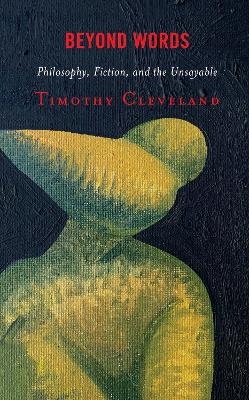
Beyond Words
Philosophy, Fiction, and the Unsayable
Seiten
2022
Lexington Books (Verlag)
978-1-7936-1484-1 (ISBN)
Lexington Books (Verlag)
978-1-7936-1484-1 (ISBN)
Beyond Words argues that some works of fiction and poetry are especially, perhaps even best, suited to expanding our awareness and understanding into the nature of things otherwise unsayable and unconceived. Such literary works do philosophy, showing us something that a theoretical—scientific or philosophical—discourse cannot literally say.
It is commonplace to regard many great works of literature—poems, dramas, works of fiction—as in some sense philosophical, yet ever since Plato, there has been a tension between the kind of abstract theorizing that goes on in philosophy and the focus on concrete particulars that occurs in poetry and fiction. Beyond Words: Philosophy, Fiction, and the Unsayable elaborates on and addresses this Platonic tension, asking in what sense, if any, literature in the form of poetry, drama, short stories, and novels can contribute significantly to our philosophical understanding. Timothy Cleveland suggests there is something in certain poems, novels, and stories that makes them especially, perhaps even best, suited to expanding our awareness and understanding into the nature of things otherwise unsayable and unconceived. Such literary works do philosophy, showing us something that a theoretical—scientific or philosophical—discourse cannot literally say.
It is commonplace to regard many great works of literature—poems, dramas, works of fiction—as in some sense philosophical, yet ever since Plato, there has been a tension between the kind of abstract theorizing that goes on in philosophy and the focus on concrete particulars that occurs in poetry and fiction. Beyond Words: Philosophy, Fiction, and the Unsayable elaborates on and addresses this Platonic tension, asking in what sense, if any, literature in the form of poetry, drama, short stories, and novels can contribute significantly to our philosophical understanding. Timothy Cleveland suggests there is something in certain poems, novels, and stories that makes them especially, perhaps even best, suited to expanding our awareness and understanding into the nature of things otherwise unsayable and unconceived. Such literary works do philosophy, showing us something that a theoretical—scientific or philosophical—discourse cannot literally say.
Timothy Cleveland is professor of philosophy at New Mexico State University.
Preface
Introduction: Encountering the Ineffable
Chapter 1: The Platonic Paradigm
Chapter 2: The Experience of the Unsayable
Chapter 3: The In Principle Ineffable and the Trivially Ineffable
Chapter 4: Showing What Can Be Said
Chapter 5: Showing What Cannot Be Said
Conclusion: How Plato Could Have Settled the Ancient Quarrel
Bibliography
About the Author
| Erscheinungsdatum | 17.08.2022 |
|---|---|
| Verlagsort | Lanham, MD |
| Sprache | englisch |
| Maße | 159 x 235 mm |
| Gewicht | 386 g |
| Themenwelt | Geisteswissenschaften ► Philosophie ► Sprachphilosophie |
| Geisteswissenschaften ► Sprach- / Literaturwissenschaft ► Anglistik / Amerikanistik | |
| Geisteswissenschaften ► Sprach- / Literaturwissenschaft ► Literaturwissenschaft | |
| ISBN-10 | 1-7936-1484-9 / 1793614849 |
| ISBN-13 | 978-1-7936-1484-1 / 9781793614841 |
| Zustand | Neuware |
| Haben Sie eine Frage zum Produkt? |
Mehr entdecken
aus dem Bereich
aus dem Bereich
Aspekte einer Ontologie des Logos
Buch | Hardcover (2024)
Springer Fachmedien (Verlag)
119,99 €
Wie die Menschheit zu ihrer größten Erfindung kam
Buch | Softcover (2022)
C.H.Beck (Verlag)
18,00 €
Macht und Legitimität politischer Sprache im Prozess der europäischen …
Buch | Softcover (2023)
Nomos (Verlag)
74,00 €


